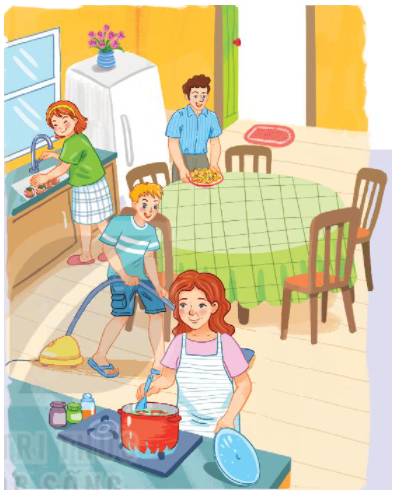I. Đặt câu với các từ được gợi ý, dùng thì hiện tại tiếp diễn (present progressive tense) của động từ.
1. He / swim
2. Nam / jog
3. Thu and Lan / play badminton
4. They / play soccer
5. The children / play volleyball.
6. Tan and Ba / play tennis
7. She / do aerobics
8. Linh / skip rope
9. The boy / read a book
10. Quang / write a letter
II. Hãy sắp xếp các chữ cái thành từ đúng mà em đã học.
1. ioscaerb 3. sywaal
2. ontbdainm 4. mestimeso
5. denkwee 8. pamc
6. icnipc 9. reven
7. teki 10. tonfe
III. Đặt câu theo các từ hoặc nhóm từ được gợi ý, dùng thì hiện tại đơn (Simple present tense) của động từ.
1. He / swim / every day.
2. Ba / jog / every day.
3. Mai / play badminton / every afternoon.
4. The children / play volleyball / every evening.
5. The girl / skip rope / every day.
6. My father / jog / every day.
7. She / often / do aerobics.
8. Nam / sometimes / play table tennis.
9. His friends / play soccer / every Sunday.
10. I / swim / every afternoon.
IV. Đặt câu hỏi cho các câu trả lời sau.
1. _____________________________?
She goes jogging once a week.
2. . _____________________________?
They often go to the park.
3. _____________________________?
Yes, they sometimes have a picnic.
4. _____________________________?
No, they don't go camping every week.
5. _____________________________?
She plays tennis.
6. _____________________________?
I'm playing badminton.
7. _____________________________?
I often go fishing in my free time.
8. _____________________________?
They never go camping because they don’t have a tent.
9. _____________________________?
He reads twice a week.
10. _____________________________?
He feels tired now.
V. Đặt các trạng từ vào đúng vị trí trong câu
1. I am busy on weekdays, (always)
2. Do you read a newspaper in the morning? (often)
3. Lan listens to music in her free time, (usually)
4. Where does she have breakfast? (sometimes)
5. Minh goes fishing, (never)
VI. Đọc kỹ đoạn văn sao và trả lời các câu hỏi bên dưới.
Lan has three meals a day: breakfast, lunch and dinner. She usually has breakfast at home. She has bread, eggs and milk for breakfast. At school Lan and her friends always have lunch at one o'clock. They often have fish or meat, vegetables and soup for lunch. Lan has dinner with her parents at home at 7 o'clock. They often have meat or fish, bread, chicken and vegetables for dinner. After dinner, they eat some fruits or cakes. Lan likes dinner because it is a big and happy meal of the day. Her family go out for dinner once a month.
* Questions:
1. How many meals does Lan have a day?
2. What time does she always have lunch?
3. What does she have for breakfast?
4. What do Lan and her parents often have for dinner?
5. What do they do after dinner?
6. Is dinner a happy meal of the day?
7. Why does Lan like dinner?
8. How often do her family go out for dinner?
VII. Điền một từ thích hợp vào chỗ trống.
1. How many children __________she have?
2. Today is__________. We do not work. We're all at home.
3. My father is __________a book.
4. What is your__________food?
5. __________is her sister doing?
6. Our class begins__________seven o'clock.
7. Sorry. I'm not__________tonight.
8. How__________do you go camping? Once a year.
9. Which__________do you play? I play soccer.
10. What does Lan do__________her free time? - She goes shopping.
VIII. Cho dạng đúng của động từ trong ngoặc.
1. Ha (like) __________badminton. She often (play) __________badminton with her friend, Lan. They (play) __________it every Thursday afternoon. They (play) __________badminton in the yard now.
2. What__________your sister (do) __________in her free time?
She (skip) __________rope.
3. Where (be) __________Nam?
He (be) __________in his room. He (play) games.
4. Which sports your children (play) __________?
They (play) __________soccer. They (play) __________soccer at the moment.
5. Anh (do) __________aerobics in the gym three times a week.
IX. Đổi các câu sau sang thể phủ đỉnh và nghi vấn.
1. Mai brushes her teeth twice a day.
2. Ba and Lan sometimes go to the zoo.
3. I usually play sports.
4. He is listening to music now.
5. She sometimes has a picnic.
6. They often go camping on Sundays.
7. Nam often goes to the park.
8. She always has some orange juice after lunch.
9. We sometimes have some bananas.
10. Miss Thu usually eats some vegetables.
X. Sắp xếp các từ sau thành câu hoàn chỉnh.
1. Vy / does / often / what / have / breakfast / for?
2. usually / on / do / Mondays / you / to / go / school?
3. Mary / two / and / milk / glasses / Tom / of / want.
4. often / she / go / does / how / cinema / to / the?
5. twice / Miss Lan / listens / music / week / a / to.
6. she / never / with / camping / goes / her / friends.
7. Hung / what / does / do / time free / in / his?
8. games / play / video / I / often.
9. play / you / sport / which / do?
10. listening / music / she / is / to / at / moment / the.
TEST 12
I. Hoàn tất đoạn văn sau, sau đó trả lời các câu hỏi bên dưới.
Quang likes camping (1)_________ the weekend, he often goes camping (2) _________ the mountains. He usually goes (3) _________his friends. Quang and his friends always wear strong boots (4) _________warm clothes. (5)_________always take food, water and a camping stove. Sometimes, they
(6) _________ overnight.
* Questions:
1. What does Quang like?
2. Where does he often go camping?
3. When does he go?
4. Who does he usually go with?
5. What do they always wear?
6. What do they always take?
7. Do they camp overnight?
II. Đặt câu hỏi cho những từ được gạch dưới.
1. My sister likes shopping.
2. He goes to the cinema once a week.
3. They live in the country.
4. She wants some iced tea.
5. Her mother wants two bottles of cooking oil.
6. Her favorite sport is swimming.
7. I often play tennis in my free time.
8. We want two boxes of pencils.
9. There are twenty students in the classroom.
10. Mai often has dinner at 7 p.m.
III. Sắp xếp các danh từ sau thành 2 nhóm đếm được và không đếm được: tea, meat, chair, book, table, milk, pen, pencil, coffee, ruler, egg, bread, banana, onion, rice, orange juice, box, oil, water.
IV. Tìm và sửa lỗi các câu sau:
1. These is any onions.
2. Miss Lan go to the cinema twice in a week.
3. He needs any meat.
4. Do you have some cooking oil?
5. I have often vegetables, fish and meat for dinner.
V. Đặt các trạng từ vào đúng vị trí của nó trong câu.
1. I go to the cinema (often)
2. She is a good student (always)
3. He drinks coffee (every morning, at home)
4. My mother goes swimming (never)
5. My parents go to work on Mondays (usually)









1. Is he/she learning English? Yes, he / she is.
Are they learning English? Yes, they are.
(Cô ấy/ Anh ấy/ Họ đang học ngôn ngữ à? – Đúng vậy.)
2. What is he/she doing now? He's / She's watching TV.
What are they doing now? They're watching TV.
(Cô ấy/ Anh ấy/ Họ đang làm gì? – Cô ấy/ Anh ấy/ Họ đang xem tivi.)
3. Is he/she learning the same language? No, he/she isn't.
Are they learning the same language? No, they aren't.
(Cô ấy/ Anh ấy/ Họ có học cùng một ngôn ngữ không? – Có.)